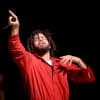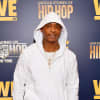Diddy's Dirty Money crew performed to a rapturous audience at the Hammerstein Ballroom on Friday. It was as much a tribute to Diddy's career as to his latest record. Last Train To Paris is a tour-de-force amalgamation of pop, European dance, R&B and hip hop that finds a perfect cohesion by uniting these strains into one cosmopolitan cocktail about the psychological contradictions and paradoxes of love: how you can hate that you love and find a pulse of risk and terror under the slick veneer of confidence and style, that a nervous heart beats beneath the sleek aesthetics of success.
Lloyd opened for Diddy; his vocals are sugary-sweet with buried flecks of grain and syrupy melody that might come apart in other hands. He is one of the more able performers in the genre, and this was best illustrated by the room-dominating reassurance in his performance of 2010 hit “Lay It Down.” The biggest response of the night, though, came when was Ja Rule joined Lloyd and Ashanti onstage for a performance of the duo's decade-old hit “Always on Time," the ballroom's response resonated like an airplane hanger.
In an appropriately dramatic gesture, Diddy kicked off his headlining performance with the cavalcade of pinwheel Swizz Beats synthesizers that swarm “Yeah Yeah You Would.” Guest artist Grace Jones—like many of the guests from Last Train to Paris—did not make an appearance. For fans of the album, this was an obstacle Diddy would have to stretch to overcome—Last Train to Paris is a project reliant on collaboration. Some appeared prerecorded. Floating above via a large television screen, it seemed like Rick Ross and Lil Wayne had Skyped their performances. Other songs, such as album highlight “Shades,” which featured Justin Timberlake and Bilal, among others, were avoided entirely. The screens were effective, though, and the audience played along, gazing up wide-eyed at Wayne's hooded visage during the spacey ecstasy of “Strobelight.”
Some of the record's best songs, though, relied primarily on the twin singers that dominate the LP, Dawn Richard and Kalenna Harper. The mesmerizing “I Hate That You Love Me,” with its engrossing groove and mantra-like piano motif served as a taut canvas for the song's striking melodic moments. The track has hooks, but it's brief melodic lines that stand out as moments of revelation. This is particularly true live, where much of the mid-range is lost in a spacious venue, and the vocalists alone are at times responsible for the crowd's attention. The most riveting example is on the ostensible dance song “Ass on the Floor,” a shift inward for hip hop's typically extroverted approach to club tracks. These songs perfectly delineate the genre-blending at work: R&B's solipsistic tremors of the heart, the style and attitude of hip hop, the icy, enveloping spirituality from dance music.
The audience for most of the Dirty Money material seemed sucked into its world. Many couples on Friday date nights lip-locked in very public displays of affection for the bulk of this material. It's this quality that separates it from the rest of the Puffy catalog: a euphoric feeling of being lost in the music. It was visible in the faces of the audience, which shifted rather suddenly from rapt attention to boisterous recognition during the hip hop quick-mixing that greeted Diddy's overlong greatest-hits medley. He is first and foremost an entertainer, though, so he kept the surprises coming: an invigorated Black Rob, apparently no longer on the outs with his former boss, hit the stage to perform an impeccable version of his 2000 hit “Whoa,” and Q-Tip arrived to perform out-of-breath renditions of Tribe hits and “Vivrant Thing.” But in the end it was Puffy's show. No moment summed this up more than his finale, where the rapper performed “I'll Be Missing You” over an instrumental loop of Sebastien Tellier's “La Ritournelle” while his street team danced in the audience, dressed in ties and trenchoats while hoisting giant placards for Ciroc vodka.


